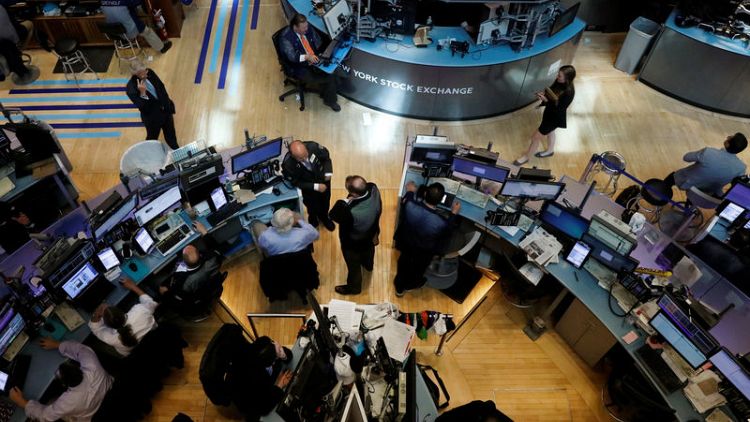(Reuters) - Following are five big themes likely to dominate the thinking of investors and traders in the coming week and the Reuters stories related to them.
1/ TIME FOR SOME VOODOO?
So after three years of pumping 2.6 trillion euros (2.23 trillion pounds) worth of stimulus and cutting interest rates to minus 0.4 percent, the ECB has admitted its growth/inflation targets remain elusive and those emergency-era monetary settings will have to persist for a lot longer. The ECB is not alone. Doubts abound around the world about whether developed economies have enjoyed lasting benefit or been fully repaired by trillions of dollars of bond buying "quantitative easing" from central banks over the past decade. Japan has been in this funk for decades. The Federal Reserve is finding "normalization" of its policy settings difficult. Of late, slowing economic momentum has seen Australia, Canada and Sweden turning tail on policy tightening plans.
All this speaks loud and clear to the current economic policy zeitgeist – a raging debate around MMT, or Modern Monetary Theory, effectively a reworking of monetary theory by the left of the U.S. Democratic Party ahead of next year’s elections. MMT advocates posit that policymakers in countries fortunate enough to manage the world's main reserve currencies should, as long as inflation remains as subdued as it is right now, just keep interest rates at zero and print money to invest in environment and infrastructure projects.
With interest rates near zero and inflation structurally depressed, they argue that government deficits and debt levels far higher than the sometimes arbitrary limits set by current orthodox policy can be both sustainable and productive in seeding higher and better-quality economic growth in the longer term.
The idea is akin to British opposition Labour leader Jeremy Corbyn's proposal of "People's QE" a few years back. Some politicians across Europe too, especially among Italy's populist coalition government, have railed against fiscal orthodoxy as strangling growth. Many have called on the ECB to support debt-funded government reinvestment programmes. Mainstream economists such as Larry Summers dismiss MMT as "voodoo" and as MMT balks at the idea that bond and currency markets should continue to be allowed to dictate government spending levels and priorities, many financial market economists also oppose the notion.
But as Europe shows, no one can argue that tried and tested orthodoxy has really worked. Expect to hear more about a rethink of economic policy theories like this as May's European Parliament election approaches and campaigning gets going for 2020 U.S. presidential elections.
How ECB QE is adding up - https://tmsnrt.rs/2UuQUMA
2/BREAKING POINT
Three votes in three days! The Brexit saga returns with a vengeance on March 12 when Prime Minister Theresa May risks another crushing defeat of the deal she's negotiated with the EU. Another defeat for May — who as of Friday had no new concessions from Brussels to present to parliament — could just reignite fears about an eventual no-deal Brexit outcome. It will also deal a blow to the pound that's rallied in recent weeks as this risk was priced out.
If May loses the vote, lawmakers will get to vote on March 13 and 14 to rule out a no-deal Brexit and on delaying Britain's departure. Depending on whom you ask, agreement to delay will either settle nerves or prolong the unknown.
A Reuters poll of economists predicted Brexit to be delayed by a few months, with a free-trade deal eventually agreed But uncertainty is showing up in currency derivatives markets, with one-month implied volatility -- capturing the March 29 Brexit date -- at its highest since mid-January. The pound too has come off recent highs.
No-deal Brexit probabilities IMG - https://tmsnrt.rs/2Ua88yG
A BUYERS' STRIKE?
Was December's dismal retail sales report in the United States a one-off pause in consumer spending caused by the stock market meltdown? Or was it the start of a trend? That question could be answered on Monday when January data is released -- roughly three weeks later than normal after the partial government shutdown in December and January disrupted the data release schedule.
The figures will be a key signal about how well the U.S. consumer and economy are standing up to a worldwide slowdown. Overall sales are seen edging up 0.1 percent in January after dropping 1.2 percent in December, the biggest fall since 2009. Several subsets of the series saw an even more-alarming decline -- for instance the so-called 'core' measure of retail sales slid 1.7 percent for its largest decline since 2001.
Even against that bleak backdrop, the December falloff in online sales was especially weak. In the hitherto booming sector, the 3.9 percent decline was the largest since the financial crisis and marked the worst December ever for the 'nonstore' category that stands as a proxy for online sales. Another month of weakness will confirm the storm clouds are gathering and the stimulus impact is well and truly over.
Retail sales due for a bounceback? - https://tmsnrt.rs/2VCu6e6
SLOW AND SLOWER
The message that rang loud and clear from China's annual parliament meeting was: stability is paramount. Which is why the authorities kept growth targets within a broad 6.0-6.5 percent range, cut taxes but kept fiscal easing well short of 2015 levels. And they emphasized yuan stability as a priority. Yet, reading between the lines, one might conclude that to keep growth above 6 percent, China needs to be flexible about credit growth and deficit targets.
But after February's 20 percent-plus exports contraction and the sharp imports slowdown, it seems a matter of when, not if, benchmark interest rates will be cut. Upcoming data on industrial output, retail sales, housing and credit will also come against the backdrop of speculation about what deal U.S. President Donald Trump and his Chinese counterpart Xi Jinping will eventually reach on those all-important trade tariffs.
China NDRC cuts growth target, outlines stimulus - https://tmsnrt.rs/2UmfAa9
5/RE-RUN IN EM
The Argentine peso in recent days has led emerging currencies in a race to the bottom, plumbing record lows. Others such as the Turkish lira and South African rand have followed closely.
One culprit is the strong dollar which has surged to its highest level since June 2017. But domestic factors are also to blame. Aside from problematic politics and high inflation, Turkey, Argentina and South Africa rely heavily on external financing. Slowing world growth will weigh on such markets' prospects. Turkey and Argentina were also clobbered with economic forecast downgrades by the OECD, while South Africa’s economy too has slowed.
There are signs investment into emerging equities and bonds is starting to slow. It all stirs memories from 2018 when a buoyant first quarter dissolved into selling, with Turkey and Argentina getting walloped by currency crises. Both countries have since taken steps to recover. Investors will be wondering whether those are sufficient to stop history repeating.
EM currencies vs dollar - https://tmsnrt.rs/2UtXQd2
(Reporting by Mike Dolan, Tom Finn and Tom Arnold in London; Dan Burns in New York; Vidya Ranganathan in Singapore; Compiled by Sujata Rao; Editing by Frances Kerry)



